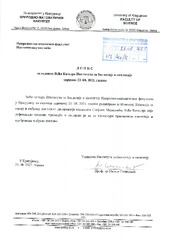Biohemijska karakterizacija izabranih biljnih vrsta iz rodova Triticum, Avena i Trirticosecale u uslovima toplotnog stresa
Biochemical characterizations of selected plant species from the genera Triticum, Avena and Triticosecale under conditions of heat stress
| dc.contributor.advisor | Đukić, Nevena | |
| dc.contributor.other | Lozo, Jelena | |
| dc.contributor.other | Joković, Nataša | |
| dc.contributor.other | Živančev, Dragan | |
| dc.creator | Marković, Stefan | |
| dc.date.accessioned | 2022-10-05T20:56:09Z | |
| dc.date.available | 2022-10-05T20:56:09Z | |
| dc.date.issued | 2021-11-18 | |
| dc.identifier.uri | http://eteze.kg.ac.rs/application/showtheses?thesesId=8549 | |
| dc.identifier.uri | https://fedorakg.kg.ac.rs/fedora/get/o:1491/bdef:Content/download | |
| dc.identifier.uri | https://nardus.mpn.gov.rs/handle/123456789/20722 | |
| dc.description.abstract | Porast temperature na globalnom nivou negativno utiče na prinos žitarica širom sveta. Istraživanja povezana sa načinom odgovora žitarica na toplotni stres su važna i omogućavaju razumevanje biohemijske osnove toplotne tolerancije kod žitarica. Ona otvaraju mogućnost za korišćenje novih znanja u efikasnom odabiru komercijalnih sorti žitarica kao i mogućnost za kreiranjem novih toplotno-tolerantnih sorti žitarica. Predmet istraživanja ove doktorske disertacije je uticaj toplotnog stresa na različite sorte žitarica i njihov biohemijski i molekulski odgovor u toku tri eksperimentalne godine, sa ciljem širenja fundamentalnih znanja o biohemijskoj osnovi toplotne tolerancije kod žitarica. U toku trogodišnje analize praćen je uticaj toplotnog stresa na veći broj parametara biljnih zaštitnih mehanizama i na elemente prinosa. Utvrđeno je da su antioksidativni i zaštitni mehanizmi bili izraženiji u toku toplijih godina istraživanja (2016. i 2018.) u odnosu na 2017. godinu koja je bila umerenija, što ukazuje da temperatura značajno utiče na analizirane parametre. Na osnovu rezultata utvrđeno je da toplotni stres utiče na pad vrednosti proteina i fotosintetičkih pigmenata u listu žitarica, a dovodi do porasta prolina i malondialdehida. Imunoblot analiza ekspresije eEF1A, EF-Tu, HSP101 i HSP18 je pokazala da dolazi do značajnog povećanja njihove ekspresije u uslovima toplotnog stresa kod žitarica. U uslovima toplotnog stresa došlo je i do povećanja aktivnosti antioksidativnih enzima. Rezultati ove doktorske disertacije, sugerišu da se analizirane sorte žitarica značajno razlikuju u sposobnosti reagovanja na toplotni stres, što može biti korisno za razvoj sorti primenom biotehnologije i programa oplemenjivanja, kako bi se dobile nove sorte otpornije na visoku temperaturu. | sr |
| dc.description.abstract | Rising temperatures on global scale are affecting cereal yields worldwide. Research related to cereals respond to heat stress is very important because they provide an understanding of the biochemical basis of heat tolerance in cereals. This research opens the possibility for the use of new knowledge in the efficient selection of commercial varieties of cereals as well as the possibility for the creation of new heat-tolerant cereals varieties. The subject of this doctoral dissertation is the influence of heat stress on different varieties of cereals and their biochemical and molecular response during the three experimental years, with the aim of expanding fundamental knowledge about the biochemical basis of heat tolerance in cereals. During the three years of analysis, the influence of heat stress on several parameters of plant protecting mechanisms and on yield elements was investigated. It was found that antioxidative and protective mechanisms were more induced during the warmer years of research (2016 and 2018) compared to moderate year 2017, which indicates that the temperature significantly affected the analyzed parameters. Based on the results, it was found that heat stress affects the decrease in proteins and photosynthetic pigments in cereal leaves and leads to an increase in proline and malondialdehyde content. Immunoblot analysis of the expression of eEF1A, EFTu, HSP101 and HSP18 showed that there is a significant increase in their expression under conditions of heat stress in cereals. Under the conditions of heat stress, there was an increase in the activity of antioxidative enzymes. The results of this doctoral dissertation suggest that the analyzed cereal varieties differ significantly in their ability to respond to heat stress, which could be useful for development of varieties using biotechnology through breeding programs, to obtain new varieties more resistant to high temperatures. | en |
| dc.format | application/pdf | |
| dc.language | sr | |
| dc.publisher | Универзитет у Крагујевцу, Природно-математички факултет | sr |
| dc.rights | openAccess | en |
| dc.rights.uri | https://creativecommons.org/licenses/by-nc-nd/4.0/ | |
| dc.source | Универзитет у Крагујевцу | sr |
| dc.subject | toplotni stres | sr |
| dc.subject | heat stress | en |
| dc.subject | žitarice | sr |
| dc.subject | elongacioni faktori | sr |
| dc.subject | HSP101 | sr |
| dc.subject | HSP18 | sr |
| dc.subject | prolin | sr |
| dc.subject | malondialdehid | sr |
| dc.subject | antioksidativni enzimi | sr |
| dc.subject | fotosintetički pigmenti | sr |
| dc.subject | prinos | sr |
| dc.subject | cereals | en |
| dc.subject | elongation factors | en |
| dc.subject | HSP101 | en |
| dc.subject | HSP18 | en |
| dc.subject | proline | en |
| dc.subject | malondialdehyde | en |
| dc.subject | antioxidative enzymes | en |
| dc.subject | photosynthetic pigments | en |
| dc.subject | yield | en |
| dc.title | Biohemijska karakterizacija izabranih biljnih vrsta iz rodova Triticum, Avena i Trirticosecale u uslovima toplotnog stresa | sr |
| dc.title.alternative | Biochemical characterizations of selected plant species from the genera Triticum, Avena and Triticosecale under conditions of heat stress | en |
| dc.type | doctoralThesis | |
| dc.rights.license | BY-NC-ND | |
| dc.identifier.fulltext | http://nardus.mpn.gov.rs/bitstream/id/146204/Stefan_Markovic_pmf.pdf | |
| dc.identifier.fulltext | http://nardus.mpn.gov.rs/bitstream/id/146205/Doctoral_thesis_12608.pdf | |
| dc.identifier.rcub | https://hdl.handle.net/21.15107/rcub_nardus_20722 |



